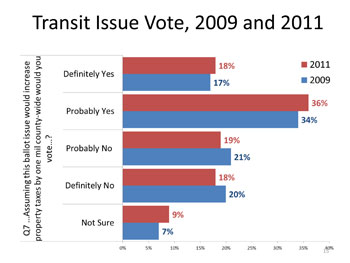AATA OKs AirRide; Survey Results Positive
Ann Arbor Transportation Authority board meeting (Feb. 16, 2012): The board’s monthly meeting began with a presentation from Hugh Clark of CJI Research Corp., which conducted a survey of Washtenaw County voters in late 2011 to measure their attitudes toward paying an additional 1 mill tax for countywide transit.

Survey results on the question of supporting a 1 mill tax for transit. (Image links to .pdf with higher resolution image.)
The results were generally consistent with those of a survey conducted two years ago by the same company. Asked toward the start of the interview if they would support a 1 mill tax for countywide transit, 54% of respondents said they definitely or probably would. Asked the same question toward the end of the interview, after receiving additional information, that figure nudged upward to 59%. That compares with “before” and “after” percentages of 51% and 58% two years ago. The geographic differences fell along predictable lines, with support strongest in Ann Arbor and weaker in the outlying townships.
Clark told the board that the four take-aways from the survey results are: (1) the AATA is highly regarded; (2) the public remains supportive of transit, even at a rate of a 1 mill tax; (3) the most compelling reason people give for supporting a tax for countywide service is to provide door-to-door service for seniors and people with disabilities; and (4) the most compelling reason people give for not supporting a tax for countywide service is a concern about taxes – not the efficiency of the AATA in its use of tax money. The board also heard caution during public commentary about the interpretation of survey results – they hadn’t yet seen the impact of negative advertising on any ballot proposal.
The survey comes in the context of an effort to establish an expanded countywide governance structure for the AATA, which might include asking voters to approve additional transit funding.
In its main business of the meeting, the board passed two resolutions that establish service between downtown Ann Arbor and Detroit Metro Airport. It’s expected to begin in April. One resolution set the fares for the service – basic one-way fare is $15 – while the other approved the contract with Indian Trails (Michigan Flyer) to provide the service based on a per-service-mile dollar cost. The service will be branded as “AirRide.” At the board table, David Nacht recalled how he’s wished for the moment when the AATA could offer such a service between Ann Arbor and the airport since the time he’d been appointed to the board – nine years ago.
The airport service is part of the AATA’s effort to expand services, as well as its governance and funding base, to a geographic area beyond the city of Ann Arbor. Of the $1 million the AATA has budgeted to spend from its reserves for the fiscal year 2012 budget, around $300,000 will go to support the airport service – though board members discussed the possibility that up to half of that could be recouped after-the-fact from federal or state grants.
In the context of the AATA’s effort to expand to countywide governance, the board passed a resolution at its Feb. 16 meeting expressing a basic policy position that a possible new regional transit authority – encompassing Washtenaw, Wayne, Oakland and Macomb counties – should not be allowed to have a negative impact on the AATA’s own provision of local transit services. The new RTA is described in a set of bills currently being considered by the Michigan state legislature. The boards’ resolution also explicitly states that any new RTA needs to have a funding strategy that is above and beyond current levels of funding for transportation.
Two days earlier, according to a report from the Michigan Information & Research Service (MIRS), Washtenaw County commissioner Conan Smith testified before the senate’s transportation committee that he’d be open to giving up one of Washtenaw County’s two seats on a 10-member RTA board, in order to get the legislation passed.
In other business at the meeting, the AATA board also approved a $95,500 increase to the budget for its consultant on the countywide expansion effort. And the board authorized its annual application to the state for operating assistance – including a budget for expanded services.
Also discussed at the board meeting, though no formal vote was taken, was the AATA’s policy on the number of bags that passengers are allowed to carry on when using the A-Ride – the AATA’s paratransit service. Previously there was a two-bag limit. The policy has been revised so that the limit is not expressed in terms of a number, but rather in a way essentially stipulating that a passenger’s bags should not impinge on other passengers’ space – it’s a shared ride service. The change in policy was prompted by public commentary delivered at AATA’s November 2011 board meeting from a visually-impaired passenger who’d been denied a ride by the AATA’s contractor for the service, because he’d had too many grocery bags. [Full Story]



